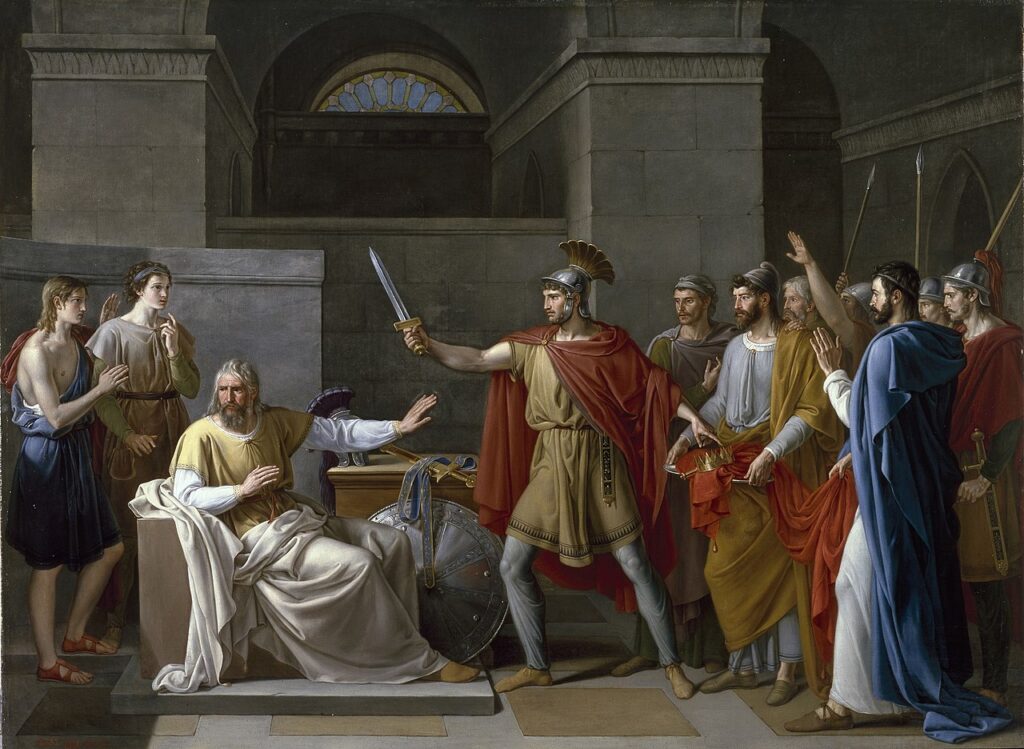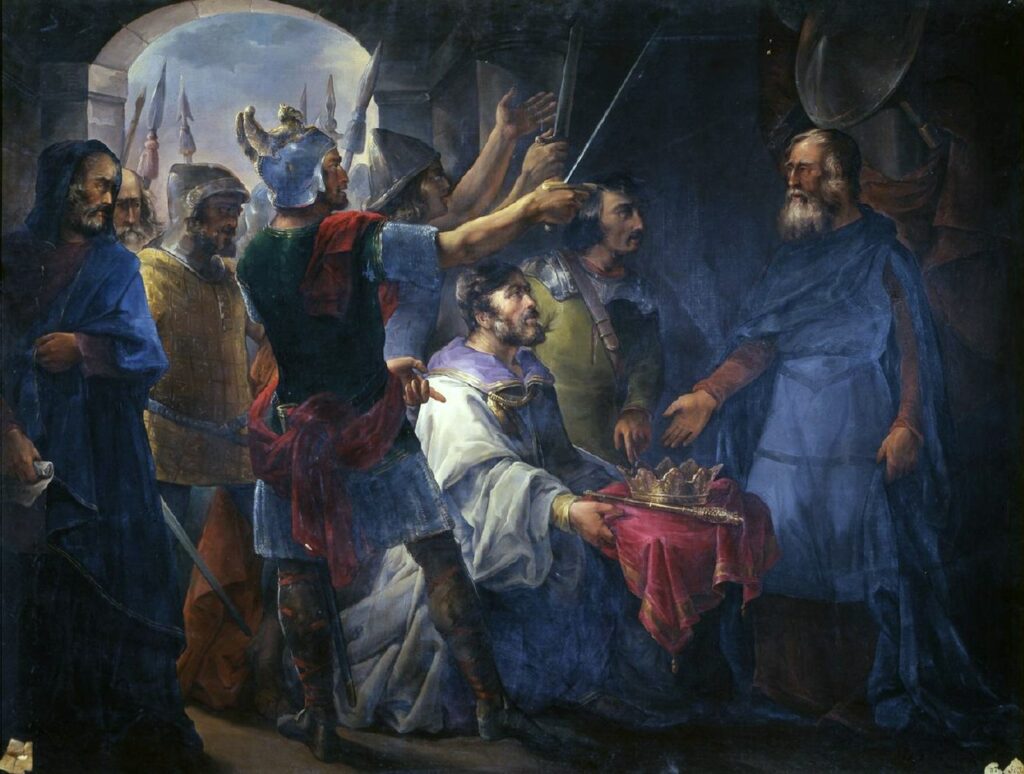Nicolas Roberto Robles
Badajoz, Spain
 |
|
Figure 1. Wamba Renouncing the Crown. Juan Antonio de Ribera, oil on canvas, 1819. Museo del Prado. Via Wikimedia. Public domain. |
In AD 409, the Iberian Peninsula was invaded by the Suevi and the Vandals (of Germanic stock) and the Alans (of Asian origin). The Visigoths came next. They had entered into an alliance with imperial Rome with the purpose of ejecting these invaders from Iberia, and after several years of warfare, established their own kingdom in Spain and the south of France. Of the thirty-five Visigoth kings who reigned in Toulouse (France) and later in Toledo (Spain), many ended up being assassinated. Such was the fate of Wamba, who became king when he was seventy-two years old and reigned for eight years.1,2
According to the Chronicle of Alfonso III, Erwig or Ervigius, a cousin of a former king, gave Wamba a poison made from cooking esparto grass. Wamba became confused, then comatose, and was on the brink of death, so that on 14 October 680 Bishop Julian of Toledo gave the extreme unction and had him tonsured and dedicated to the Lord, thereby invalidating him as king. Documents were drawn up and apparently signed by the half-unconscious Wamba, recommending Erwig as his heir. When a few days later Wamba emerged from his semi-comatose state and fully recovered, he found that he was no longer king and spent the remaining seven years of his life confined to a monastery.2
 |
|
Figure 2. The Election of Wamba as King. Francisco de Paula Van Halen, oil on canvas, 1843. Real Academia de Bellas Artes de San Fernando. Via Wikimedia. Public domain. |
What gives credence to this story is that Wamba’s symptoms were identical to those caused by esparto. This plant contains an alkaloid called cytisine, which even in small amounts acts like nicotine and strychnine, causing prolonged amnesia, extreme weakness, and prostration resembling death. The properties and use of this plant had already been described by Dioscorides, who compared it to the dangerous hellebore, as well as in the Etymologies of St. Isidore. The fact that the Chronicle of Alfonso III expressly mentions esparto, a fragrant broom, and that its toxic effects, well known in the Visigothic times, perfectly match the symptoms suffered by Wamba, are a powerful indication of the truth of the story and that this king was the victim of a conspiracy. The nobles who conspired with Julian and Erwig did not lose a single moment, and on 21 October, they anointed him as the new king. Wamba had no children but, to avoid complications, Erwig made Égica, the carnal nephew of Wamba (he was son of his sister Ariberga), husband of his daughter, Cixilo. On Erwig’s death, Égica became the new king.
Cytisine has been used to assist in quitting smoking in Eastern and Central Europe since the 1960s, but its use for the most part has not spread elsewhere.3 It is extracted from Laburnum anagyroides (also known as golden chain or golden rain), a plant structurally similar to nicotine.4,5 Its lessening of nicotine withdrawal symptoms results from its ability to bind to the alpha-4 beta-2 nicotinic acetylcholine receptor (nAChR) subtype.6
By a destiny twist, as in the case of several other poisons, cytisine has become a potentially useful therapeutic drug.
References
- Gibbon, Edward. History of the Decline and Fall of the Roman Empire, Vol. 3. Project Gutenberg eBook.
- Soto Chica, José. Los visigodos: Hijos de un dios furioso. Madrid: Desperta Ferro Ediciones; 2020.
- Etter JF, et al. “Cytisine for smoking cessation: a research agenda.” Drug Alcohol Depend. 2008;92(1-3):3-8.
- “Laburnum anagyroides.” Wikipedia. Accessed March 22, 2023. https://en.wikipedia.org/wiki/Laburnum_anagyroides.
- Tutka, P and Zatonski, W. “Cytisine for the treatment of nicotine addiction: From a molecule to therapeutic efficacy.” Rep. 2006;58:777–798.
- Phusahat, P, et al. “Efficacy and Safety of Cytisine in Combination with a Community Pharmacists’ Counselling for Smoking Cessation in Thailand: A Randomized Double-Blinded Placebo-Controlled Trial.” Int J Environ Res Public Health. 2022;19(20):13358. doi: 10.3390/ijerph192013358.
NICOLAS ROBERTO ROBLES is professor of nephrology at the University of Extremadura (Badajoz) and member of the Academy of Medicine of Extremadura.
Winter 2023 | Sections | History Essays

Leave a Reply